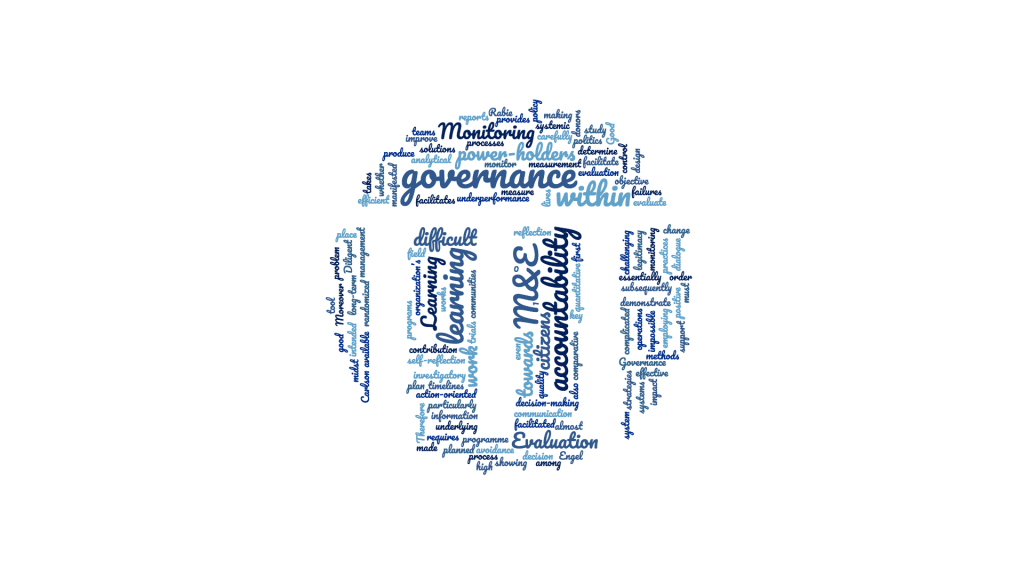Learning processes are facilitated by communication, self-reflection, and dialogue. The learning objective underlying Monitoring & Evaluation (M&E) is to determine failures and underperformance within a system, essentially employing it as an investigatory tool to improve programme design and plan solutions. Moreover, M&E facilitates comparative study among strategies, which could be manifested into analytical, action-oriented reports that facilitate effective decision making and efficient problem solving or prevention. Therefore, the contribution of M&E towards learning and reflection subsequently provides management teams with high quality information made available for the policy- and decision-making process.
Good governance requires that citizens monitor power-holders and that power-holders evaluate whether their systems and practices produce the intended positive impact on citizens’ lives. In order for their work on governance and accountability to have legitimacy, they must first demonstrate good governance and accountability within their organization’s own programs and operations. Diligent and carefully planned monitoring, evaluation, and learning are key to showing this accountability to the communities in which we work and support.
Monitoring & Evaluation (M&E) is also particularly challenging within the governance field. It takes place in the midst of complicated politics, where quantitative methods of measurement, such as randomized control trials, are almost impossible. It works towards long-term, systemic change that is difficult to measure and even more difficult to do so within donors’ timelines.

Nevertheless, our project on ICT4Democracy focused on achieving a degree of rigor in its M&E by integrating a process of continual monitoring, evaluating, and learning into the work, rather than just conducting an after-the-fact evaluation. While we could not expect immediate results at the beginning, it was the most critical time to evaluate what was and was not working, as the costs of change are much greater later down the line. This process of continual learning and adaptation has helped the organizations participating in our Communities of Practice (CoPs) to keep up with volatile political environments and shifts in public perception.
Just as political will is a critical prerequisite to improving governance, buy-in from key stakeholders was a critical ingredient to successful M&E. In order to truly integrate M&E into our program, we:
- Ensured that entire teams understood its value and how it fits into their daily responsibilities – this was through facilitating joint learning sessions between county governments and citizens and civil society organizations that implement governance programs.
- Asked the participants in our program for feedback on what indicators were meaningful to them and what data collection methods worked best in their context.
We purposed to strengthen buy-in even further by being transparent about our objectives, creating a safe space for all parties to give honest feedback, and making sure that none of the concepts that we used or trained them on was confusing to them. We also developed monitoring methods that catered to the local ICT cultures in the project sites, including: ICT forums in which our teams facilitate discussions between all our partners in a county about their progress and challenges (Through WhatsApp, Facebook and Twitter); and impact “calls” through focus groups in which our local partners, participants, and/or experts reported on and answered questions about their impact on their agreed work plans, allowing iHub to capture impact stories.
Beyond raising awareness on ICTs for governance and democracy, and encouraging responsible behavior among citizens and government officials, our efforts also sought to shift policies and systems. Policy change is a collaborative effort with a wide variety of factors at play, and with a longer term outlook. Therefore our project sought to promote the achievement of short term milestones first, then build on long term goals. For example, although the corruption perception has not improved in both National and County governments since we started our work, we have not yet reached a significant enough portion of the population to claim influence on this broad subject. However, we can specifically track how our CoPs platforms in the ICT4Democracy program gave youth, CBOs, CSOs and government officials a platform where they can co-create and test short term solutions to problems facing the counties and document learning on how to implement similar reforms in other Counties.
We can conclude that:
- The COPs provide an important platform for respective counties to build and sustain their M&E systems by adopting best practice and lessons.
- M&E which demands accountability, transparency, efficiency and improved service delivery is an essential management and administrative tool to improve government performance.
- In addition, M&E systems are installed within a governing system because of their proven record of facilitating improvement in governing system performance.
- The legitimacy and efficacy of state or county is ultimately assessed through satisfaction of the citizens. Good governance is regarded as the outcome of effective application of administrative, management and auxiliary functions.
- M&E augment these functions which require constant gathering and assessment of data for the implementation of policies, programmes or projects. This assists institutions to establish the extent of their success and achievement of the goals against baseline data or indicators.
- A sound M&E system forms an indispensable part of other systems and subsystems in an institution or government.
With this knowledge, citizens and governments could have significant progress in planning and policy-making; improve programme management, resource allocation and budgeting; maintain harmony within the system through government control and coordination; introduce accountability within organisations, which results in transparency and is considered favourably by stakeholders; and ensures effective participation.
